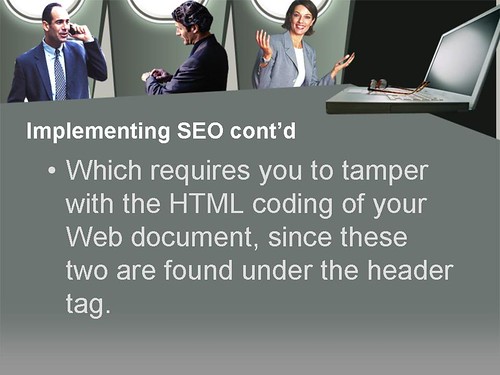Many website owners simply market through paid advertising slots and articles and hope for the best. Although these techniques might work, only well-executed SEO can be effective in boosting those websites to the coveted front page of the search results. Using the tips in this article will increase the visibility of your website.
Keyword density is vital when you optimize a web page for search engines. To avoid this, try to keep your total keyword content to under twenty percent of any given page.
Search Engines
When writing content as part of a search engine optimization strategy, it is important to not use Associated Press style, and instead focus on your SEO techniques. This means striking a delicate balance between including the keyword enough for the search engines to notice while not making the text sound awkward. Search engines look for keywords and their density on the site, so doing this should increase your sites ranking.
When you help the web spiders, you can expect to grow in search rank. Web spiders will find your content based on keywords, but your site should be easy for them to use. To help the spiders understand the hierarchy of your website’s pages, craft a site map highlighting the most important factors of your site.
Search engine spiders do not understand URLs in the same way people do. You want to remember this when you create your URLs. References to page numbers and sessions will only confuse the spider. This makes it harder for search engines to find your website, especially if keywords are not incorporated.
Getting your PageRank up requires getting, and keeping, visitors. There is more and more evidence available suggesting that how long a visitor stays on a site affects their PageRank, according to Quantcast scores. Increases the rank of the site. You can use discussion groups and forums to convince visitors to stay logged in to your site for a longer time.
You need to have a list of all of your site content if you want the most out of search engine optimization. Spiders can easily decipher you site if you have a site map. If you site is on the larger side, a second map may be needed. Each map should not exceed 100 links in size.
Search Engines
Create descriptive, short title tags to make it easier for search engines to understand and index your page’s content. Use 60 characters of fewer because search engines typically will not display any more content than that. Search engines pay less attention to keywords after a certain point.
A site map is an important part of your website if you want search engines to be able to create an index of your site pages. A site map is also known as the navigation bar. This part of your web site will let search engines know how many pages your web site has and what each one contains. A site map will help rankings, no matter how small the site is.
You might actually be able to get some traffic to your site while your site is ranked on the back pages, but your traffic would exponentially increase as soon as you started to implement the proper SEO tactics. By using the tips you’ve just read in this article, you can start to raise the profile of your website.
